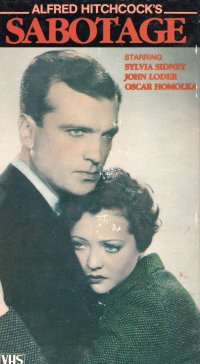 Oh, but no, gentle reader. Next, after Dracula, I did not delve into a Godzilla movie. Instead, I picked up this early Hitchcock film as Universal was pitching Hitchcock movies on videocassette in the trailers before that film. As I had this on videocassette and had freshly let it play soundlessly to rewind it, I popped it in over the weekend as well.
Oh, but no, gentle reader. Next, after Dracula, I did not delve into a Godzilla movie. Instead, I picked up this early Hitchcock film as Universal was pitching Hitchcock movies on videocassette in the trailers before that film. As I had this on videocassette and had freshly let it play soundlessly to rewind it, I popped it in over the weekend as well.
You know, in English class, they warn you against starting your essay with a dictionary definition, and I’ve seen that happen a couple of times in the Lenten devotional my church’s congregation compiled. And Hitchcock uses it with the titles on this film: The camera focuses on a dictionary definition of sabotage as what we would later call terrorism (of a sort, of course, not necessarily involving sabots). A blackout strikes London. Outside a cinema, the patrons demand a refund from the woman in the box office, and she tries to put them off. A vendor next door sees the cinema owner return, and the cinema owner washes sand from his hands as authorities discover sand caused the outage. When he meets his handler at the aquarium, the handler tells him to do something more serious, but the man tries to demur, not wanting to have a hand in the loss of life. But the cinema owner eventually gets a bomb to plant in Picadilly, but his gang discovers that the vendor working next door is actually a Scotland Yard detective, so they want nothing to do with the plot. So the cinema owner sends his young brother of his wife (the woman in the box office) to deliver the package. So the main tension of the film is whether the boy will deliver the bomb before it explodes. He is delayed by a parade and whatnot, and….
Damn, Hitchcock has the bomb go off whilst the boy is on the bus. The origin of the bomb is recognized by the films that the boy was also carrying, leading Scotland Yard to his residence. But before they get there, the sister/wife stabs the husband, but the murder is eventually covered up by the arrival of the bomb maker who sets off another explosion covering the wife/sister’s crime.
It definitely has some of the earmarks of Hitchcock’s later work, the ratcheting of tension and the actual danger involved which imperils characters that you think would be safe (especially in modern Hollywood productions). But the director is still learning, so this is a film for serious film students. Or indiscriminate purchasers of dollar videocassettes.
I actually bought a boxed set of Hitchcock’s early movies on DVD, so I might have it elsewhere. Unlike, say, a Cary Grant movie, I will not feel compelled to watch it again should I come across it. It’s a public domain thing off of a bad film print. The first reel looks to have been in rough shape indeed, making me wonder if my videocassette player was on the fritz (as it had trouble handling a VHS copy of Cast Away earlier), but it looks to only have been the particular cassette.
I’ll definitely watch for Hitchcock’s Hollywood films in the wild, but the early British stuff (like this) can be a bit hit or miss.



1 thought on “Movie Report: Sabotage (1936)”
Comments are closed.